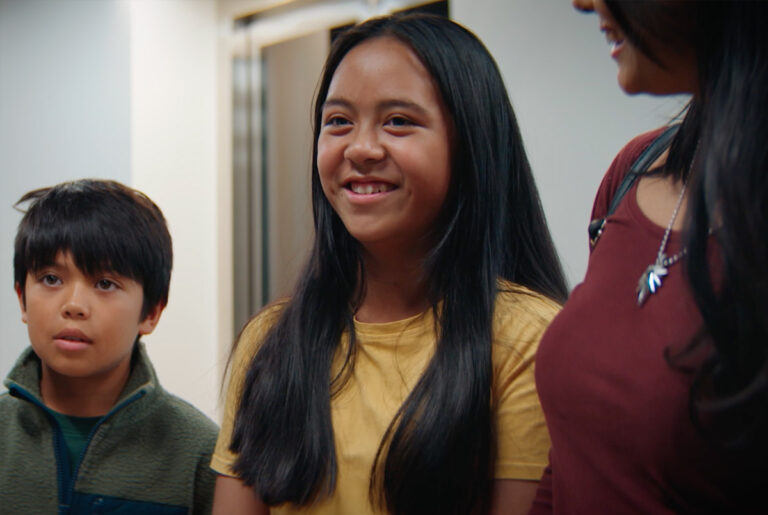Changes to the family due to a relationship breakdown or separation can be confusing, stressful and emotional. But Family Dispute Resolution, also sometimes known as family mediation, can really help. Here, we explain what you need to know about Family Dispute Resolution, as well as how and where you can access the service in NSW.
Family Dispute Resolution (FDR) is a practical way for separating or separated partners to try and resolve disagreements, and make arrangements for the future. It’s a way of jointly working through decisions in relation to children, finances and property after a relationship has ended. The process can take place at any time after a relationship has ended – sometimes even years later.
It offers an alternative to family law court or legal proceedings and is a structured process where an impartial third person, the Family Dispute Resolution Practitioner (FDRP), supports individual parties to communicate and express their thoughts and needs to one another, to find solutions and reach agreements that allow them to move forward.
Sessions take place with a qualified FDRP, who facilitates conversations around matters that can be sensitive and emotional, helping people develop their own agreements.
During FDR, both parties will get support and guidance to make important decisions – that will impact their lives and long-term future – together. This improves the likelihood that the agreements will be followed, which will avoid further conflict and disruption for themselves and any children.
Other benefits of FDR include:
- Saving money and time, as FDR is usually quicker and less costly than the court process
- Promotion of cooperation and communication to enhance the ongoing parenting relationship
- Providing parents with a structure and the skills to help resolve future disputes more easily
- Maintaining the individuals’ control in the decision-making process, as there are no imposed decisions
- Less stress or trauma than court proceedings.
Essentially, yes. Mediation is a structured conflict resolution process that uses a third party, usually called a mediator, who helps disputing parties reach a mutual agreement.
FDR is a special type of mediation designed to discuss and resolve family law issues following the breakdown of a relationship. A Family Dispute Resolution Practitioner (FDRP) facilitates the FDR process.
While FDR may seem like a challenging, or even confronting process, it is often a faster, less stressful and costly process than going through other forms of dispute resolution such as a family law court proceeding.
The benefit of FDR is that parties forge the agreement together, rather than having an outcome imposed by a judicial or court decision. For many parties, mediating one’s own agreement has been found to improve their ability to find workable solutions in the future, and to help them move forward.
Under Australian family law, unless the case is not suitable for FDR, if a party wants to commence court proceedings in relation to a parenting dispute, they must first attempt to resolve the dispute in FDR before approaching the family law courts. If FDR is suitable, the process can help parties to decide on children, parenting and property arrangements.
FDR is not always the right process for everyone who has gone through a separation. In some cases, the FDR Practitioner (FDRP) may determine that FDR is not suitable for the family and will provide referrals, support and information about the next steps. To make this decision, each person meets with their assigned FDRP individually to discuss their circumstances and identify whether there are any reasons why FDR may or may not work for them at that time.
FDR may cover:
- Practical arrangements for how children will spend time with each parent, significant carers, and other family members
- Reducing conflict between parents
- Cultural needs and considerations
- Complying with court orders and agreements
- Finances including the division of property, assets, and debts
- Family pet ownership
- Holidays and special events
- Education and schooling
- Health and medical
- Plus more
Pre-FDR assessment
After both parties have agreed to participate in the FDR process, they will have a pre-FDR assessment. This is an individual meeting with the FDR Practitioner (FDRP) that lasts about 1.5 hours. The purpose of this session is to determine whether FDR is appropriate, to complete a safety risk assessment, and identify what each party wants to achieve from the FDR process. The FDRP will also provide information about how to prepare for joint sessions, what to expect, further referrals and answer any questions.
First joint session
Based on the pre-FDR assessment, the FDRP will confirm if FDR is suitable, and book in the first joint session where both parties attend. The FDRP will also confirm how the session will proceed, for instance – if parties will meet in the same room or separately and if are other people are involved, such as a co-FDRPs, lawyers or support persons.
Joint mediation sessions
In most cases, it is normal for parties to require several joint sessions to complete their FDR process. Most FDR sessions are booked for three hours, and this includes time for short breaks or private discussions.
Throughout the FDR process, the FDRP will check in with all parties to see how they are coping and feeling with the process, any concerns, and adjust how the FDR has been set up to respond to new information. For example, parties initially mediating in the same room may later move to separate rooms.
If an agreement can’t be reached, a 60I certificate can be issued instead – see more information below.
When occurring in-person, FDR takes places at at a Family Relationship Centre (FRC). Relationships Australia NSW have six FRCs throughout NSW that provide FDR and other services for separating families, including counselling and group relationship education. They provide valuable support for people who need help to manage their relationship breakdown. This includes challenges and disputes around post-separation parenting or property arrangements.
FDR usually takes place through a mix of online and in-person sessions. This will be dependent on the circumstances of the parties, where they reside in relation to a physical centre as well as from one another, any preferences expressed by the parties, as well as any disclosures about risk or safety which may indicate the suitability of different modalities. The FDR Practitioner will discuss the options for modality with parties as part of the pre-FDR assessment before booking in the first joint session.
Relationships Australia NSW offers an Access Family Mediation Service, which is delivered entirely online or over the phone.
FDR is a much more affordable option than settling via the Family Court system. At Relationships Australia NSW, we’re not-for-profit, and we pride ourselves on making our services accessible and have a sliding fee scale. Fees can also be waived in cases of financial hardship. We encourage you to call us on 1300 364 277 to learn about the cost for you.
Unfortunately, FDR cannot guarantee parties will reach an agreement on all the issues they wanted to resolve. In some cases, parties reach enough agreements to move forward. In other cases, parties may still want or need to pursue an outcome after FDR has ended. The FDR Practitioner (FDRP) will discuss possible referrals for your next steps.
Parenting
If you’re unable to reach an agreement in FDR or the FDR process is unsuccessful for another reason, an FDRP can offer to issue you with a 60I Certificate. This Certificate is provided to the Federal Circuit and Family Court of Australia when an application for parenting orders is filed.
60I Certificates can only be issued by a registered and accredited FDRP and will be offered to parties when:
- They have both attended an FDR session and made a genuine effort to resolve the dispute but an agreement couldn’t be reached
- One party did not attend FDR
- The FDRP has assessed your case wasn’t appropriate for FDR.
The 60I Certificate is valid for one year from the date of the last FDR session. If a party later decides to apply to the family law courts for parenting orders, the Court will require the 60I Certificate to be filed with the Court Application.
Property and financial
If property issues cannot be fully resolved in FDR, the FDRP will provide a copy of any property outcomes reached in joint mediation. This will assist parties in obtaining further legal advice regarding their options for a resolution. There is no equivalent ‘60I Certificate’ for property mediation prior to any court application.
The FDR Practitioner (FDRP) will talk to parties in their one-on-one pre-FDR assessment session about any recommended preparations they should make before the first joint session. Preparations may include:
- Reading or reviewing resources which relate to the topics to be discussed such as parenting arrangements or property settlement
- Obtaining legal, financial or other types of advice to ensure parties are fully informed before starting their negotiations with one another
- Practising self-care and support ahead of the session or requesting referrals for counselling if this is recommended
- For property mediations, gathering financial documents and information (such as bank statements, real estate appraisals superannuation documents) and completing a simple balance sheet
- Ensuring children are at school or will be cared for during the session as there are no childcare facilities available in the centre.
It is recommended for all parties to seek family law legal advice before commencing FDR. If they are also wanting to discuss property issues, it is also recommended to talk with a financial broker, planner or counsellor. The FDR Practitioner is not able to provide any legal or financial advice.
Getting legal advice can help increase the possibility of reaching an agreement, by giving parties a realistic understanding of the legal options and remedies that apply to their unique situation, as well as helping parties to understand the range of outcomes they may be entitled. If parties are unsure or unclear about how family law applies to their circumstances, legal advice will help clarify the law, and assist them to make informed decisions in FDR.
In property mediation discussions, financial advice from a broker, consultant/planner, or financial counsellor can be really helpful to establish the current value assets or debts as well as help parties understand what they can financially sustain to meet their part in any agreement moving forward. This may include how much they are able to borrow to refinance a loan into their name, bankruptcy or debt negotiations, access to funds to complete renovations, or dealing with self-managed superannuation funds.
In some cases, it can be agreed by both the FDRP and the other party for other people to be present during mediation sessions including lawyers or support persons, however, this needs to be discussed and negotiated ahead of time. The role of a support person is to provide emotional support to a party who requires this support to effectively participate in mediation. The role of a lawyer is to provide as needed legal advice during the process and to assist the parties to resolve their dispute out of court. There are agreements a support person or a lawyer will need to sign before they participate in a mediation. Please talk to staff or you FDRP if you would like to consider these options.
Yes, you can access FDR even if you and the person you’re separating from don’t have any children – however in these circumstances, FDR is voluntary when no children are involved.
Your FDR Practitioner can work with you to help resolve any disputes involving financial and property arrangements.
The family law system in Australia encourages separating parents to try to develop a cooperative parenting solution themselves, without going through the Family Court system. The expectation is that applications to the Court will only be made if disputes can’t be resolved, or if an agreement can’t be reached through FDR.
In these cases, people will need to obtain a 60I certificate if they want or need to commence court proceedings.
FDR is a process that requires both parties to agree to participate. In this respect, it’s a voluntary process, and no one can be compelled or forced to attend. When only one party wants to attend, the process cannot go ahead.
If FDR relates to parenting or children’s issues, the FDR Practitioner may issue a 60I Certificate to the party who wanted FDR at our service. If a party later decides to apply to the family law court for parenting orders, the Court will require the 60I Certificate to be filed with the Court Application.
If FDR is related to property or financial issues, the party who requested the service should seek legal advice about alternatives to resolving the dispute.
The safety of parties is a crucial factor in determining whether FDR is suitable.
There are several opportunities for parties to share their concerns for the safety of themselves, the other party, or children prior to any joint session taking place. At the initial telephone meeting with the Family Advisor, parties are screened for immediate risk and safety concerns. They will identify if there are any family violence and protection orders in place, as well as any child protection concerns. Parties may be asked to attend a longer intake appointment to discuss these risks in more detail and complete a risk screening survey.
All parties who attend the individual Pre FDR assessment appointment with the FDR Practitioner (FDRP) are asked to complete a risk screening survey, if not done earlier in the process. This survey is designed to assist the FDRP to identify a broad range of safety concerns or risks that may be impacting the family at that time. The FDRP will explore these with the parties as part of the suitability assessment.
In cases where FDR has already commenced, the Practitioner may reassess the suitability of FDR continuing, if new safety concerns or disclosures are made.
The FDR Practitioner will also discuss referrals for support, such as counselling, domestic and family violence support, education groups and advice. If FDR is not suitable, the FDR Practitioner will also talk to parties about the 60I Certificate.
An FDR Practitioner (FDRP) or mediator is there to facilitate and guide the process to ensure all participants can safely and effectively participate and keep the discussions on track. The FDRP is also responsible for assessing the suitability of FDR to proceed based on the unique circumstances of each case.
All FDRPs employed by Relationships Australia NSW have the required FDR qualifications and training for this role, and are all accredited and registered as FDRPs with the Attorney General’s Department (Commonwealth) to conduct FDR in Australia. Practitioners may have a range of other qualifications including in law, counselling and/or social work.
The FDR Practitioner (FDRP) remains impartial and non-judgemental throughout and won’t take sides or make decisions on behalf of the parties. In parenting FDR, the FDRP will focus on the needs and interests of the whole family, and especially what might be happening for the children.
The FDRP will give all participants the opportunity to speak about what is important to them and ensure both parties feel heard as well as have a chance to ask questions and share information with each other before making any decisions or reaching agreements.
The FDRP will also write up any agreements reached during FDR and provide a copy of any documentation to parties at the end of mediation.
FDRPs don’t give legal advice, but will explore general principles that apply to couples who are separating. They may give advice about children and parenting matters, focusing on the best interests of the child. They are impartial and fair to both parties; focused on the future, and on helping the parties resolve their dispute. The FDR process is confidential, within the limits of the law.
A request for a specific FDR Practitioner (FDRP) due to cultural or religious reasons may be raised with staff at the first appointment to better understand the request and explore how we can try to accommodate this need. We recognise people’s backgrounds, values, family circumstances and connections are diverse, and we work with people from all walks of life. We have extensive experience working with a wide range of families including Aboriginal and Torres Strait Islander families and families from culturally and linguistically diverse backgrounds. We can also provide an interpreter at every session, if necessary, at no extra cost to clients.
In some FDR cases, parents may agree to participate in a process called Child Inclusive Practice (CIP). This process involves the parents and children meeting individually with a practitioner called a Child Consultant. A Child Consultant is trained in working therapeutically with children and adolescents, particularly around separation and divorce.
Relationship breakdowns are often emotional and difficult, and it’s normal to feel overwhelmed when beginning the separation process. To help you through, our Family Relationship Centres offer Family Dispute Resolution across NSW. Call your local centre via the numbers above, or Enquire now.
Related Services & Workshops

Mediation.Individuals.Divorce + Separation
Family Dispute Resolution and Mediation
Going through separation or divorce is often emotional and difficult, and it’s normal to feel overwhelmed. To help you through, we offer affordable Family Dispute Resolution services, also known as family mediation, throughout NSW.

Tailored Services.Families.Domestic Violence
Children’s Contact Service
The Children’s Contact Service provides a safe, neutral and child-focused environment for families to build and maintain meaningful relationships while staff supervise and monitor interactions.

Mediation.Individuals.Conflict
Access Family Mediation Service
Adapting to change during separation and divorce is challenging. This service provides flexible support, online or over the phone, to help manage relationship breakdowns, including resolving disputes for parenting and property arrangements.






